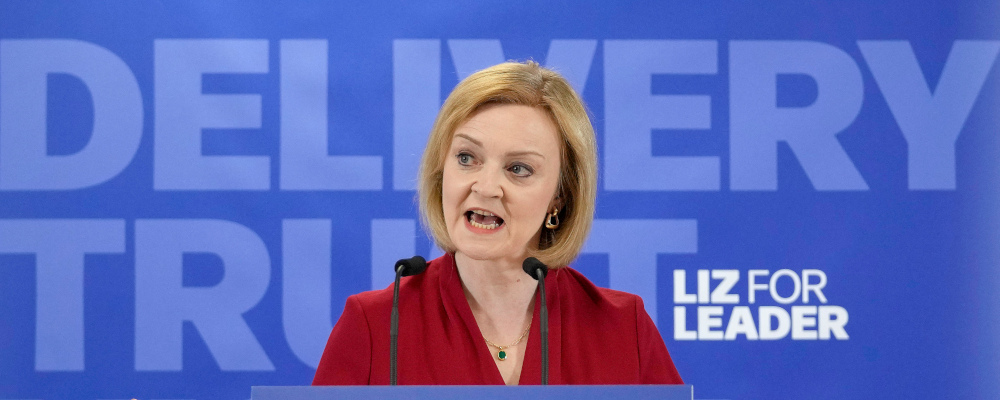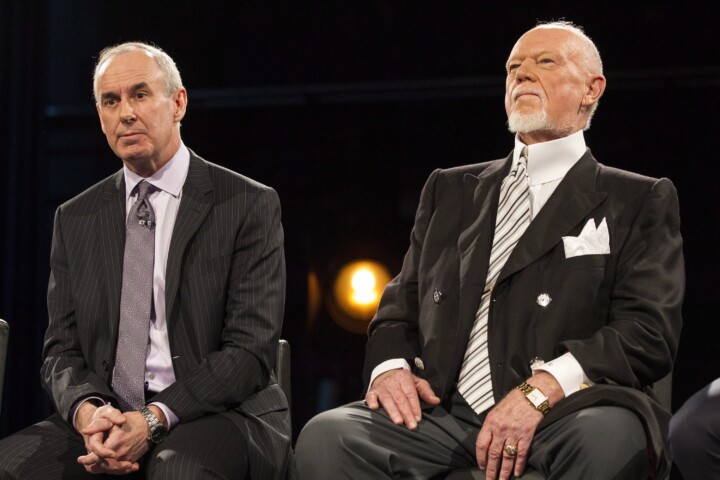Looking directly into a camera at a recent Tory leadership debate, a candidate pledged to “look again” at the central bank’s mandate because “some of the inflation has been caused by increases in the money supply.”
That candidate was Liz Truss, the current foreign secretary of the United Kingdom, and one of the final two candidates in the run-off to succeed Boris Johnson.Inside Team Truss: slow off the mark but catching up fast in race for No 10 https://www.theguardian.com/politics/2022/jul/22/inside-team-truss-slow-off-the-mark-but-catching-up-fast-in-race-for-no-10
After months of similar lines from Pierre Poilievre, I found it interesting to hear a refrain on that particular melody out of the U.K. Coming from Liz Truss no less. The most experienced Cabinet Minister in the race to replace Boris Johnson, a former Liberal Democrat, and the only candidate left in the race to have voted to Remain in the European Union. It’s not like we were hearing from the fringes of the Tory Party—though, it’s worth noting that Truss is positioning herself firmly on the Party’s right-wing in this leadership contest.
Central bankers are an interesting target for conservatives. It’s a fight that looks awkward from both an ideological and a narrative perspective.
Let’s start with this. The alarmism over the independence of central banks gets a little precious. The Bank is a creation of Parliament. Its roles and responsibilities have been amended many times by the Act of Parliament, and operational independence for the Bank wasn’t clarified in legislation until 1967.
In the United Kingdom, which has had parliamentary elections for centuries, the independence of the central bank was not codified until 1998. People have literally been Backstreet Boys fans longer than the Bank of England has been operationally independent.
Now, just because it’s not an existential threat to the survival of democracy doesn’t mean that compromising the institutional independence of the central bank is good policy. Tories are supposed to favour things like smaller government, stable investment climates, and monetary policy that isn’t subject to political whims.
When Labour introduced central bank independence to the United Kingdom in 1998, it followed decades of politically influenced monetary policy that bedevilled both major political parties and turned the pound into a political hot potato. Granting operational independence to the Bank of England is viewed as one of the great economic successes of the last quarter century in the U.K.
So, if central bank independence does a bunch of things that Tories generally like, why are Tories at odds with central bankers on both sides of the pond?
The answer, I think, starts with the 2008 financial crisis.
Conservatism used to be a narrative about success. Class envy was something for the Left. Upward mobility, more education, entrepreneurship, and, ultimately, success were core narratives for both Margaret Thatcher and Ronald Reagan. It was the nation’s job to provide you with the opportunity, and you could be as much of a success as your talent, tenaciousness, and timing would allow for.
I think the 2008 financial crisis shattered conservative faith in the impartiality of markets.
Perhaps it’s because the consequences of doing so weren’t well communicated. Or maybe it’s more fundamental and Tories just instinctively believe fairness isn’t served until the guilty are punished. But, I know more than my fair share of conservatives who believe that we should have let major investment banks fail in 2008. I know still more that would have been willing to bail them out if a few people had gone to jail. Not a lot, mind you. But I think they wanted to see a few Hermes ties and Zegna suits confiscated by the Department of Corrections.
There isn’t a ton of objective data to measure our dislike of the banking class since 2008. Recent polls by Maru Blue trying to determine our respect level for various professions found that about 53.8 percentCanada’s most respected occupations 2022 https://www.marugroup.net/public-opinion-polls/canada/canadas-most-respected-occupations-2022 of us respect bankers in Canada. That’s worse than lawyers and private long-term care home operators, but better than car salesmen and members of parliament. In the U.K, the number dips only slightly to 50.6 percent.Britain’s Most Respected Occupations 2021 https://static1.squarespace.com/static/5a17333eb0786935ac112523/t/60d49e1816b95c78390102cd/1624546842180/British+MR+Occupations+Release.pdf
One of the more interesting studies was done by the Cato Institute in 2017.Wall Street vs. The Regulators: Public Attitudes on Banks, Financial Regulation, Consumer Finance, and the Federal Reserve https://www.cato.org/survey-reports/wall-street-vs-regulators-public-attitudes-banks-financial-regulation-consumer It showed that 49 percent of Americans believe there’s “widespread” corruption on Wall Street. When asked about “Too Big To Fail” financial institutions, the study found that 2016 Clinton voters (41 percent) were twice as likely as Trump voters (20 percent) to believe some banks were too important to the financial system to fail. These numbers are American, so not instructive of Canadian or British opinion, but interesting nonetheless.
I’ve long believed the 2008 financial crisis was the transformative political event of the twenty-first century to this point (though both the COVID-19 pandemic and the Iraq War have good claims). My reasoning, however, is that while both the Left and Right viewed the response to the recession in largely negative terms, the Left took it as a systemic failure of capitalism. The profit motive was the original sin, mortgage-backed securities were just sparks to flame. That view largely helped spawn things like the Occupy movement and Corbynism
The Right took the recession as a betrayal of capitalism. Properly functioning markets, in the mind of conservatives and libertarians, would have destroyed those bad actors. A well-functioning justice system would have ensured prison time for the most nefarious traders, but the system would be intact and trusted.
None of that happened. In fact, our most powerful people went to lengths to make sure it didn’t.
Years later, those same banking CEOs are getting exorbitant compensation packages, or jetting off to Davos to talk about Net Zero and “just transitions”.
And, Pierre Poilievre and Liz Truss have them square in their sights. Fifteen years too late.
Recommended for You

Falice Chin: A tale of two (Poilievre) ridings

Evan Menzies: Calgary at 150: Why is it so hard to celebrate our history?

Howard Anglin: Canada is badly failing the ‘Tebbit Test’

‘We’re winning the battle of ideas’: Conservative MP Aaron Gunn on young men moving right, the fall of ‘wokeness,’ and the unraveling of Canadian identity



